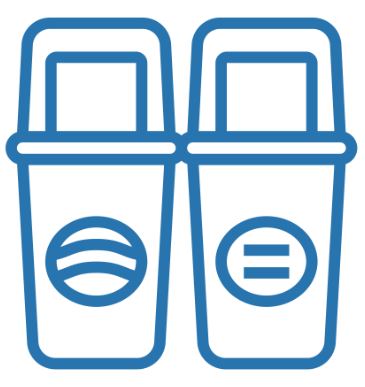
Plan Target: 90% diversion from landfill, 25% reduction of waste per capita from 2016 FY levels by 2025
UCLA has a comprehensive recycling and waste management program. The University recycles a wide variety of materials including food and beverage containers, plastics, paper, metals, green waste, food waste, construction waste, electronics, and more. The University has also pursued a number of waste reduction initiatives, from clothes donation to paperless initiatives. If you have questions about what goes in the different bins, or how to recycle different materials, check out our FAQs. For detailed data on our waste performance, please review the Waste Data Reports.

To reach our ambitious waste reduction and diversion goals, we need help from the entire UCLA community. This means taking daily, meaningful steps towards more sustainable options such as purchasing recyclable or locally compostable products in your office, bringing reusable foodware and bottles, and taking only as much as you need in the dining halls. For tips on how you can help, please review the available resources on this website.

Current Projects and Initiatives
This campus-wide education and awareness campaign aims to encourage the Bruin community to Think Outside the Landfill, providing tips and resources on how to reduce and effectively manage waste at home and on campus.
The UCLA Zero Waste team will be hosting weekly events and giveaways giveaways from late February to early April for those who participate in the Think Outside the Landfill (TOTL) Challenges. The mission of the challenge is to inspire, empower, and mobilize Bruins to explore and improve their efforts to reduce and eliminate waste by adopting sustainable habits where possible and challenging their peers.
UCLA is committed to reducing the university’s environmental impact and developed a Single-Use Plastics Policy. The policy will phase out food accessory items such as plastic utensils, cups, lids, bowls, plastic bags, and ultimately eliminate single-use plastic water bottles while increasing access to water-refilling hydration stations. This is envisioned to cover not just sit-down and take-out restaurants, but everything from conferences, catered meetings, and events large and small.
As campus moves forward with standardizing centralized waste collection, Facilities Management will be providing 3-stream containers, which will greatly expand waste diverting capacity and allow users to sort their waste into compost, recycling, and landfill streams. Personal desk-side waste baskets will no longer be serviced and building occupants will need to bring and sort their waste at centralized waste bins strategically placed throughout our facilities. Additionally, liners will no longer be provided for personal desk-side waste baskets to reduce the amount of plastic generated on campus. Please refer to our FAQ page, Centralized Waste Etiquette, and Waste Bin Requirements to help you answer any questions you may have or contact zerowaste@ucla.edu.
The Centralized Waste Do’s and Don’ts is available for download and sharing. Other resources you may wish to view are on the FAQ on centralized waste in English and Spanish. Please email any questions you may have to sustainability@ucla.edu.
As campus updates and standardizes infrastructure, Facilities Management has published a Waste Bin Requirements document is available to ensure that departments purchasing receptacles meet Facility Management’s Scope of Work and have consistent messaging. This document provides guidance on placement of waste receptacles and offers options for waste bins.
Partnerships
Contact us at zerowaste@ucla.edu if you wish to donate any materials to any of our partners.
Our Zero Waste team partners with the CPO Food Closet to provide meals to students who are experiencing food insecurity due to financial hardship, and in turn reducing food waste. With a text based service called Bruin Bites, campus community members can receive notifications about when free food is available. For details on how to donate to these efforts, check out the UCLA Food Recovery Implementation Guide.
Are you planning an office clean-out and have a lot of usable supplies for students? UCLA is working with various student organizations that will provide resources to students at no cost.
To achieve highest and best use of materials, UCLA has partnered with human-I-T to refurbish electronic waste (including lab equipment) rather than sending the materials to be recycled. The refurbished products will be provided to low-income individuals, under-served communities, and nonprofits in need of technology, internet, and digital training. The remaining non-salvageable goods will be recycled through a certified process. You can learn more about human-I-T by clicking here or submit an e-waste request through the Recycling Request Form.
Do you have furniture or small appliances in good, usable condition that can be donated? UCLA has partnered with Habitat for Humanity of Greater Los Angeles to rehome these items where proceeds are used to help build strength, stability, self-reliance, and shelter in local communities and around the world.
To help you determine what furniture is considered “good and resalable”, click here to view the slides provided by Habitat for Humanity of Greater Los Angeles.
Waste Data Reports and Plans
- 2019-2021 FY Waste Report
- 2021-2022 Q1 Waste Report
- 2021-2022 Q2 Waste Report
- 2021-2022 Q3 Waste Report
- UCLA Zero Waste Plan
- UCLA Food Recovery Implementation Guide
Media and Awards
- UCLA Newsroom: UCLA developing policy to phase out single-use plastics
- UC Carbon Neutrality Initiative: How do we break our addiction to plastic?
- Athens Services and UCLA join to “Feed People, Not Landfills”
- UCLA Newsroom: UCLA turns student cast-offs into cash for a good cause